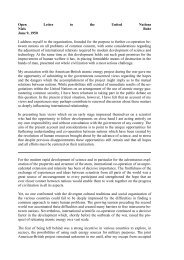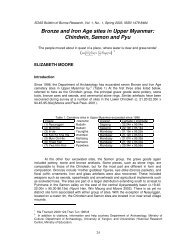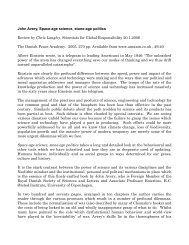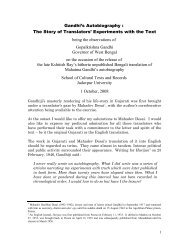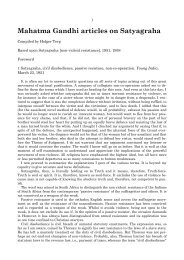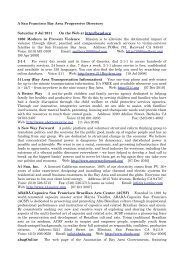THE SLAVERY OF OUR TIMES PREFACE / INTRODUCTION
THE SLAVERY OF OUR TIMES PREFACE / INTRODUCTION
THE SLAVERY OF OUR TIMES PREFACE / INTRODUCTION
You also want an ePaper? Increase the reach of your titles
YUMPU automatically turns print PDFs into web optimized ePapers that Google loves.
down into the cesspool.<br />
The slaves of our times are not all those factory and workshop hands only who must<br />
sell themselves completely into the power of the factory and foundry-owners in order<br />
to exist, but nearly all the agricultural laborers are slaves, working, as they do,<br />
unceasingly to grow another's corn on another's field, and gathering it into another's<br />
barn; or tilling their own fields only in order to pay to bankers the interest on debts<br />
they cannot get rid of. And slaves also are all the innumerable footmen, cooks, porters,<br />
housemaids, coachmen, bathmen, waiters, etc., who all their life long perform duties<br />
most unnatural to a human being, and which they themselves dislike.<br />
Slavery exists in full vigor, but we do not perceive it, just as in Europe at the end of<br />
the Eighteenth Century the slavery of serfdom was not perceived.<br />
People of that day thought that the position of men obliged to till the land for their<br />
lords, and to obey them, was a natural, inevitable, economic condition of life, and they<br />
did not call it slavery.<br />
It is the same among us: people of our day consider the position of the laborer to be a<br />
natural, inevitable economic condition, and they do not call it slavery. And as, at the<br />
end of the Eighteenth Century, the people of Europe began little by little to<br />
understand that what formerly seemed a natural and inevitable form of economic lifenamely,<br />
the position of peasants who were completely in the power of their lords-was<br />
wrong, unjust and immoral, and demanded alteration, so now people today are<br />
beginning to understand that the position of hired workmen, and of the working<br />
classes in general, which formerly seemed quite right and quite normal, is not what it<br />
should be, and demands alteration.<br />
The question of the slavery of our times is just in the same phase now in which the<br />
question of serfdom stood in Europe towards the end of the Eighteenth Century, and<br />
in which the questions of serfdom among us and of slavery in America stood in the<br />
second quarter of the Nineteenth Century.<br />
The slavery of the workers in our time is only beginning to be admitted by advanced<br />
people in our society; the majority as yet are convinced that among us no slavery<br />
exists.<br />
A thing that helps people today to misunderstand their position in this matter is the<br />
fact that we have, in Russia and in America, only recently abolished slavery. But in<br />
reality the abolition of serfdom and of slavery was only the abolition of an obsolete<br />
form of slavery that had become unnecessary, and the substitution for it of a firmer<br />
form of slavery and one that holds a greater number of people in bondage. The<br />
abolition of serfdom and of slavery was like what the 'Fartars of the Crimea did with<br />
their prisoners. They invented the plan of slitting the soles of the slaves' feet and<br />
sprinkling chopped-up bristles into the wounds. Having performed that operation,<br />
they released them from their weights and chains. The abolition of serfdom in Russia<br />
and of slavery in America, though it abolished the former method of slavery, not only<br />
did not abolish what was essential in it, but was only accomplished when the bristles<br />
had formed sores in the soles, and one could be quite sure that without chains or<br />
weights the prisoners would not run away, but would have to work. (The Northerners





